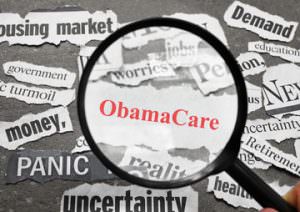Obamacare Lives
Despite its incompetent launch, the Affordable Care Act is slowly becoming part of American life, a development the Republicans have fought fiercely to prevent.
Despite its incompetent launch, the Affordable Care Act is slowly becoming part of American life, a development the Republicans have fought fiercely to prevent.
This was the conservative Republicans’ greatest fear, impelling them to shut down the federal government in a failed effort to kill the plan.
Somewhat chastened by the public revulsion at the closure, most of them joined Democrats in voting for a budget compromise that notably lacked the defund-Obamacare provision sought by the GOP. “I thought the effort to defund Obamacare was not achievable, and I think the facts bear that out,” conservative Republican Sen. John Cornyn of Texas told the Texas Monthly. The right-wing blog Red State conceded that efforts to kill Obamacare would have to wait, probably until a Republican is elected president. That won’t happen, if at all, before 2016, leaving two years for Americans to grow accustomed to a law that protects them from insurance policy cancellations and denials, unpredictable rate increases, the fear of losing insurance when leaving a job and other injustices that have long denied health care to many.
Despite the Obama administration’s inexplicable lack of planning to prepare for the opening of Obamacare exchanges, they are now signing up recipients at an increasingly fast pace.
The Washington Post’s Sarah Kliff reported Dec. 11 that 1.2 million people had gained coverage, 365,000 through policies purchased on the exchanges and 803,000 through Medicaid, the program for those with low income. Enrollment in the troubled federal exchange, HealthCare.gov, increased from 27,000 in the disastrous opening month of October to 137,000 in November.
California, which has its own exchange, has signed up 156,000 people through the first week of December, Kaiser Health News reported, with 49,700 completing their applications in that week alone, evidence of growing interest in Obamacare.
But that’s less than the government hoped for and failures still abound.
In Southern California, Anna Gorman of Kaiser Health News reported on the sluggish progress in signing up people in what should be prime territory for Obamacare, working-class Latino neighborhoods. Focusing on the small cities of Bell, Cudahy and Bell Gardens, she found a shortage of trained people to assist potential applicants, 60,000 of whom are eligible for subsidies. And many Spanish-speaking residents don’t use computers and are more comfortable with paper. That’s been complicated by a failure to provide enough Spanish language material to would-be applicants. In addition, the area’s local governments have been hard hit with scandal, weakening trust in government.
This is bad news for Covered California, the state’s exchange. Latinos, the largest minority in the state, are also the most uninsured and the youngest. Signing them up is an important part of an effort to get a recipient mix composed of younger and healthier people, along with older ones who are sick or more susceptible to illness.
Then there are the back office failures — people who have managed to sign up through the federal website and found their applications didn’t make it to the insurance company they chose or they were not enrolled in the plan they wanted. Add to that the dismay over cancelation of policies.
To check on Obamacare on the street level, I paid another visit to St. John’s Well Child & Family Center, a community health organization in the heart of South Los Angeles where I have reported on the progress of Obamacare since its passage in 2010. On this particular day, I attended a St. John’s Conference on Health and Human Rights. More than 200 people occupied every chair in the meeting room and students from a nearby high school sat along the walls. St. John’s operates community health clinics throughout South Los Angeles, and as I walked toward the headquarters facility, I saw the construction and expansion that are being financed by Obamacare funds.
The area, according to the activist community organization AGENDA, has one of the highest rates of poverty and people without health insurance in the nation. More than 40 percent of the residents live in poverty. More than 400,000 live farther than three miles from a hospital emergency room. Residents are more than twice as likely as others to be exposed to lead and other hazardous material. The area has more cases of diabetes and hypertension than any other place in vast Los Angeles County.
Illustrating the huge disparity of health care and income between South Los Angeles and more affluent areas, Dave Regan, president of the Service Employees International Union-United Healthcare Workers West, told the conference, “a day’s walk in Los Angeles is a journey from the Third World to the First World.”
I checked in with Gary Poe, a St. John’s worker whom I had met a few weeks ago when he was looking for candidates for Obamacare before signups began. He said he was continuing to visit churches, parent groups in schools, community organizations, anywhere he could find prospects. Although ever optimistic, he said it wasn’t easy work. Health insurance is a foreign concept to people who have long been denied. It’s tough convincing younger people they need it.
The SEIU-UHW’s Elliott Petty told how modern data gathering and computer analysis were helping find uninsured households. “We’re enrolling entire families,” he said, assisting people with gathering the birth certificates, tax receipts and citizenship papers needed to enroll.
It’s a revolution, but a slow one. There are no rallies that fill city squares or brutal police putting down rebels. There’s not the violence of the civil rights movement. There are no dramatic moments, just people at computer terminals or others filling out forms.
So it’s not easy to see what’s happening, that Obamacare is working its way so deeply into the heart of the medical system that it will be all but impossible to repeal. Eventually, despite the slow start, too many people will be insured — either through the exchanges or Medicaid — that they won’t want it taken away.
Your support matters…Independent journalism is under threat and overshadowed by heavily funded mainstream media.
You can help level the playing field. Become a member.
Your tax-deductible contribution keeps us digging beneath the headlines to give you thought-provoking, investigative reporting and analysis that unearths what's really happening- without compromise.
Give today to support our courageous, independent journalists.






You need to be a supporter to comment.
There are currently no responses to this article.
Be the first to respond.